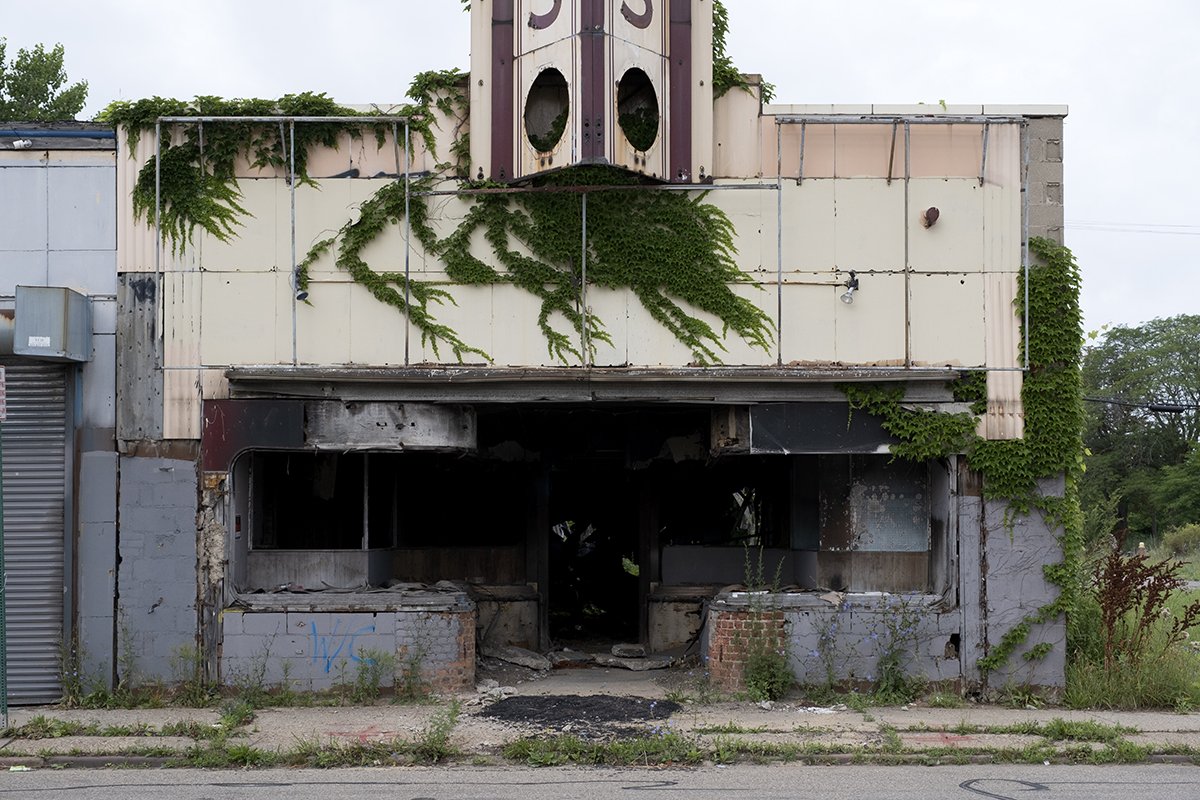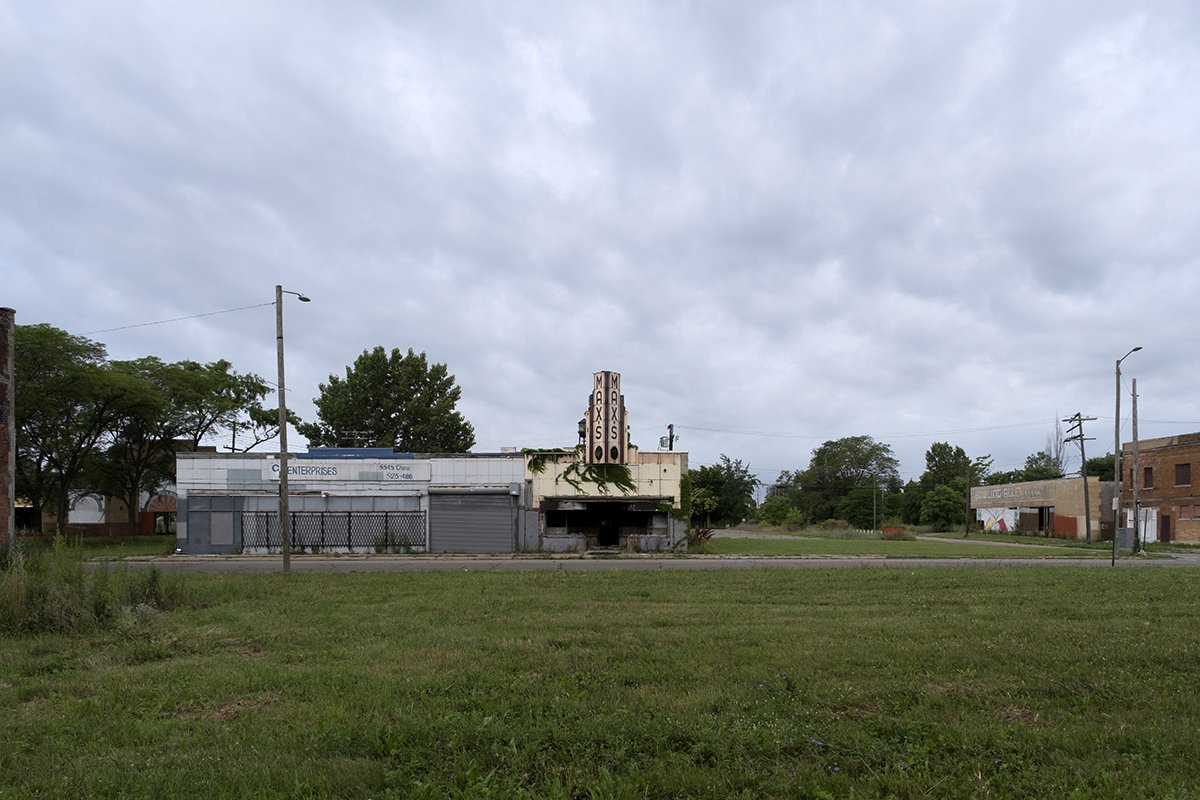5553 Chene Street
Max’s Jewelry Store, Apollo Furniture













Max’s was an essential part of the Chene Street business district for decades. From humble beginnings through the tumultuous 1960s, it was a neighborhood institution. Even today, though the business has been gone as long as it operated inside this building, the sign is still an integral part of the Poletown East skyline. And, no, this was never a theatre, so stop asking.
The first members of the Rosenbaum family came to America from Poland just after the turn of the century to escape the occupation of Poland, which caused high levels of poverty before the Great War. Eventually, Max Rosenbaum ended up in a home on Chene Street, a quiet street with a high number of Polish and German immigrants. This quaint street would eventually turn into a bustling thoroughfare with one of the most popular shopping districts in the city.
Chene Street was named after the Chene Family. The family traces their lineage in Detroit back to Gabriel Chene Sr., who left the family ribbon farm to Gabriel Chene Jr., who was said to have sold most of the Chene family’s land. The most known Chene is Alexander, best known for the 1855 home that bore his name until it was demolished in 1991 by singer Anita Baker to make way for a recording studio. That didn’t happen, and it’s home to Detroit House of Pancakes today. The Chene family is said to have enslaved people and are the origins of Chene Street’s name.
By 1913, the Rosenbaum family was in the jewelry business. Their first operation was called Fredro Jewelry Store, located inside the Fredro Theatre. Likely named for the Polish playwright and poet Aleksander Fredro, the theatre would become the King Theatre in 1939. By then, the Rosenbaum family had expanded their operation up the street. However, in 1919, Max was robbed at the shop by five men who took diamonds, rings, and watch cases valued at $6,000, or over $110,000 in 2024. All five men lived at the Alhambra Apartments in the Cass Corridor and were arrested.
By 1923, there was a Max’s Jewelry Company at 8721 Joseph Campau near where Veterans Park is today in Hamtramck. By 1928, the family had opened an operation on Chene Street inside the structure pictured here. In addition to jewelry, the store sold cameras and radios. I don’t believe this structure, 5553 Chene Street, was built for Max’s. The 1921 Sanborn Fire Insurance Map partitioned the structure into two smaller storefronts, 5553 and 5555 Chene Street. By the 1950 map, they had been merged into one.
On Sunday, February 4, 1934, a fire tore through Hamtramck and struck the structure that housed Max’s Jewelry Store. The fire department sprayed over 500,000 gallons of water on the fire, and Max’s safe, which housed more than $35,000 in jewelry, fell through the floor into the basement, which was full of water. The fire had started at Green’s Style Center next door and festered for hours before a local boy noticed it. Max said that “his stock of jewelry was seriously damaged and only partially covered by insurance,” according to the Detroit Free Press. Luckily, Hamtramck wasn’t their only source of revenue.
Max’s name was on the sign, but he wasn’t the only Rosenbaum in the business. He ran the company with his brother Sam. Max was said to have run the Hamtramck location, whereas Sam held the reigns on Chene Street. Eventually, the company expanded further, opening locations on Van Dyke, Chene, Michigan, Woodward, and Joseph Campau in Hamtramck. At one time, Max called his store “The J. L. Hudson’s of Hamtramck.”
In 1949, two kids posing as customers escaped the Chene Street location with a tray of 12 diamonds worth $2,000, or over $25,000 in 2024. Mrs. Mary Weinberg was working in the store at the time. Another article later said that the diamonds were worth $1,000.
In 1951, two bandits made off with $350 and an undisclosed number of diamonds during a hold-up at Max’s. One of the men was armed with a German automatic pistol.
By this time, Charles Rosenbaum was managing the store. The son of Sam Rosenbaum, he ran the store with his father until Sam’s retirement. Sam died on June 11, 1954. At the time of his death, he lived at 3001 Fullerton. His funeral was at Menorah Chapel at 3800 Puritan, and he was survived by his four sons, Charles, Harry, David, and Bernard.
Charles kept the storefront on Chene Street open for two decades after his father’s death. Though there were businesses that lasted longer than Max’s on Chene Street, the jewelry store was one of the longest-running operations on the thoroughfare. During the rebellion in 1967, the store was looted and vandalized. Charles’ children remember it being so difficult for him because he knew the people who were robbing him and damaging the store. Still, he remained open until 1974.
Charles, who sometimes went by Charlie Ross, perhaps in an attempt to hide his Jewish heritage, was a proud business owner and an influential member of the Chene Business Association. Outside of the workplace, he went by his full name. Though Max’s was still a staple of Chene Street, Charlie did not buy as much merchandise as the chain jewelry stores, so he couldn’t keep his prices as low as theirs, which hurt business. After closing up shop on Chene Street in 1974, Charles opened up shop on Ryan Road in Warren.
Max Rosenbaum died in 1980. Charles died in 1996. The Hamtramck Max’s location, the last one, closed in the mid-1990s. There’s still a ghost sign on the Yemans’ side of the structure; however, it grows increasingly faint each year as it faces the sun most of the day.
In 1987, the City of Detroit Commercial Department was selling the Chene Street Max’s structure. The minimum bid was $1,750. The building was listed as one and a half stories, which is incorrect.
At some point after Max’s Jewelry Store left the structure pictured here, it became Apollo Furniture. They painted their name on the marquee-style sign, which remained intact into the 2010s. In 1982, there was an advertisement for Apollo Furniture at 5500 Chene, close by.
Since the early 2000s, the former Max’s Jewelry Store has been in disrepair. Over time, the structure continued to decay, and eventually, the roof failed and began to collapse into the storefront. Around 2012, the structure suffered a fire. The buildings around the former Apollo Furniture closed up shop, too, including the Eastown Bar across the street (demolished), Computer & Electronics Enterprises Company (extant, now a venue), and Van Dyke Pastry Shop (demolished).
In 2016, Max's was a filming location for Michael Bay's Transformers: The Last Knight, which added vintage, albeit fake, ghost signs on its north outer wall for a 3-hour dry cleaner and the E. Donaldson auto-mechanic shop.
In 2018, I inquired about Max’s with the Detroit Land Bank Authority, which was listed as the current owner of the structure. I was broke at the time; however, I had fallen in love with the building and wanted to try to purchase, stabilize, and eventually renovate it. I found that they had recently sold the property to RecoveryPark Farms, a nonprofit that was, at the time, amassing vast swaths of land in the area.
Headquartered at 5470 Chene Street, RecoveryPark came into some 40 acres of land from the city at a steep discount and began creating an urban farm that would employ returning citizens. Around 2018, one of RecoveryPark’s employees saw my first post about it, which informed this post, and said that RecoveryPark planned to demolish the structure. However, they said I could have the sign if I could get it. We eventually lost contact, and the sign remains on the building.
As researched in the post on their headquarters, “According to a piece in the Detroit Metro Times, all members of the RecoveryPark staff were terminated in February 2020. Wozniak claimed that the layoffs were due to the pandemic; however, those cuts were made a month before the world shut down because of COVID-19. The non-profit went from one of the most talked about projects in the city to one almost wholly forgotten in weeks.”
After the nonprofit crashed and burned, the founder, Gary Wozniak, sold all of the operation’s land to an LLC with the same name, likely to try and hide the failure of the previous organization. This one, apparently, has nothing to do with Wozniak but is an investment consortium that includes Matthew Tatarian, a local business owner.
So, the former Max’s Jewelry Store is stuck in a lurch. Likely, it’ll be demolished, ceasing to be a notable landmark of the Chene Street landscape for the first time in over a century. I’ve been ready for it to happen since 2018, so every added day feels like a present. Still, it’ll be a somber day when Max’s comes crumbling down onto Chene Street’s pothole-ridden asphalt.
On June 5, 2025, the Max’s Jewelry Store sign disappeared. It’s unclear who was responsible for it going, but whoever did it did clean work and ensured they didn’t leave a mess behind on the sidewalk. The sign had been a staple of Chene Street for decades.
